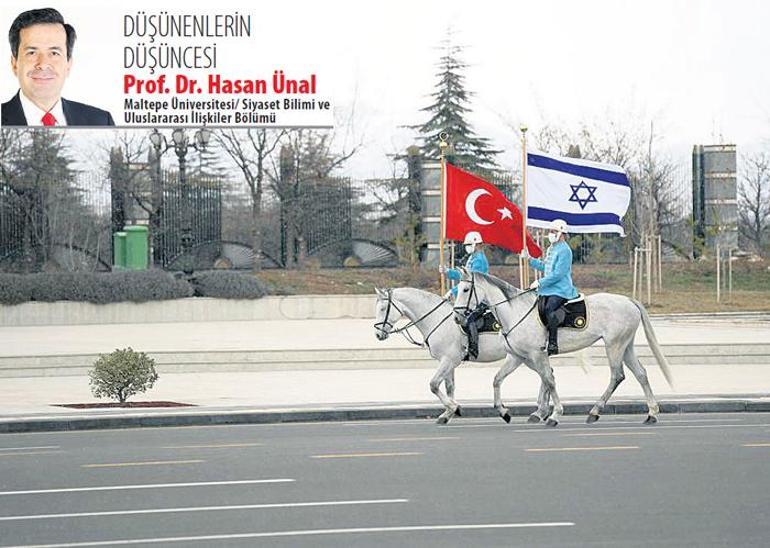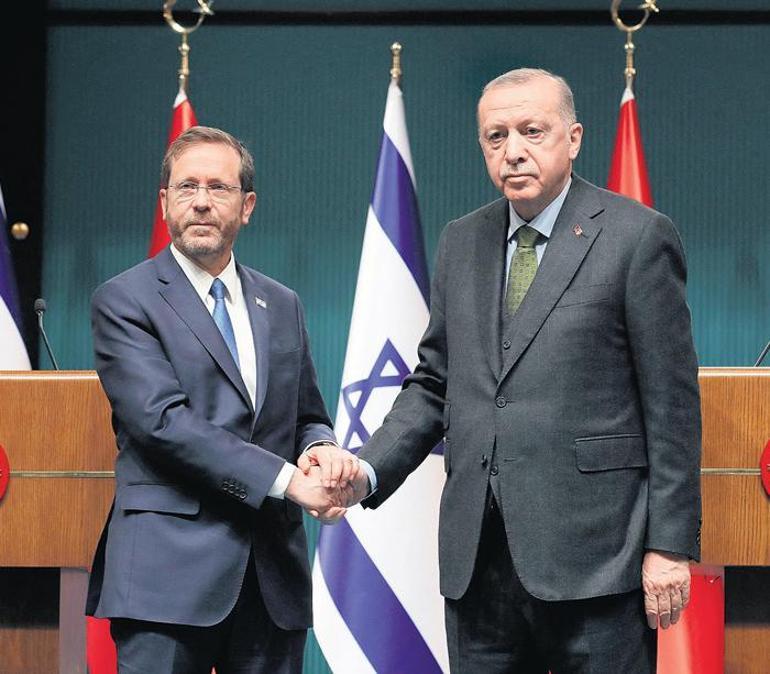prof. Dr. Hasan Ünal – Maltepe University/ Department of Political Science and International Relations
The most dangerous development in the warring years between Turkey and Israel was the military rapprochement between Israel and Greece and the Greeks. All kinds of military relations between Israel and Greece, in a sense, contain opposition to Turkey. Ending these relations in the new era that started with Israel should be Turkey’s strategic goal.

After a long period of conflict, Turkey and Israel began to take decisive steps to restore relations last year. These convergence steps, which were initiated at the level of Presidents, continued with increasing concrete content, and last week, the officials of the two countries announced that they agreed on the exchange of ambassadors. Now it seems that the tumultuous period between Ankara and Tel Aviv is over.
GENERAL RECOVERY IN TURKISH FOREIGN POLICY
The reason for the tension in the bilateral relations is that the ideological and emotional approaches that have haunted Turkey’s foreign policy for a while, this has caused Turkey to become isolated in the region and even at the global level, it also serves the benefit of Greece and Greek Cyprus, and that it will leave this political line as soon as possible. I must say that I am extremely pleased with this normalization, as someone who advocates turning away from a more balanced/careful, national interest-based foreign policy understanding.
In the same way, it is worth emphasizing that the normalization steps that Turkey started with Saudi Arabia, United Arab Emirates (UAE) and Egypt in the previous year and that it has taken/continued with concrete results and now started with Syria are extremely appropriate in terms of national interests. While getting to this point, there may be some who consider Ankara’s reversal from its old policies as a step back. This is true in the end, but the backward steps here are the right steps based on national interest.
SENSITIVE BALANCES IN TURKEY-ISRAEL RELATIONS
Turkey had established a balance in its policy towards Israel that generally put its national interests first. Accordingly, on the one hand, he would have good relations with all of the Arab countries without being a party to the fights among themselves and regardless of which party, king or person was in power, while he would also give political/diplomatic support to the legitimate rights and demands of the Arabs in the Arab-Israeli conflict. But while supporting the legitimate rights and demands of the Arabs, especially the Palestinians, he would have succeeded in doing so without unequivocally opposing Israel. Therefore, there would be a crisis of confidence with neither the Arabs nor Israel.
The unnamed strategic pillar of Turkey-Israel relations was to ensure that Tel Aviv remained neutral in the Turkish-Greek issues. This neutrality would actually mean that Israel follows a pro-Turkey policy; Because Turkey has always been the strongest military side in the ongoing tension in the Aegean and Cyprus, it was critical for Ankara that a state like Israel remained neutral.
Moreover, Turkey responded to the front formed by Syria, which played the PKK trump card against Turkey in the 1990s and acted in an unnamed military alliance with Greece, by signing a series of secret and open agreements with Israel. Turkey, which joined forces with Israel against the ‘Two and a Half War Scenario’ formed by this alliance of Syria, Greece and the PKK, first established a full and effective military superiority against the PKK in the field, and then directly attacked the Damascus Administration ( 1998 crisis and Adana Consensus); afterwards, it cooperated with Israel to a certain extent in the chain of events that resulted in Öcalan’s arrest as he was leaving the residence of the Greek ambassador to Kenya. Intense cooperation and exercises continued between the Turkish Air Force and the Israeli Air Force in the two-year crisis that broke out after the Greek Cypriots attempted to buy the S-300 missiles, the most advanced air defense systems at that time, from Russia in early 1997 in order to balance Turkey’s air power. He intimidated the Greek/Greek side and made them stop bringing these paid systems to the island.
GOING BACK TO THE OLD DAYS…
Now our goal should be to go back to those days. The most dangerous development in the quarrelsome years between Turkey and Israel was the ‘military rapprochement’ between Israel and Greece and the Greeks. It may not matter much if they establish economic and commercial relations between them; however, military relations directly target Turkey. After all, it should not be forgotten that, as it is commonly said in Anatolia, all the songs/songs of Greece are about the enmity of Turkey, and all kinds of military relations between Israel and Greece, in a sense, are implied in the saying ‘the bear has forty songs and forty are on pears’. It contains opposition. Unfortunately, the relations that started in this area in the past years and deepened due to our insistence on our wrong policies had moved to a dangerous level by including first Egypt, then Saudi Arabia and the UAE. Even though some residues and pains of the past continue for a while in the new era that started with Israel, ending these relations within a certain period of time should be Turkey’s strategic goal.
On the other hand, Turkey should make radical changes in its attitudes and policies regarding Palestine that are/will disturb Israel. In this regard, it is admirable that the Turkish authorities have taken care to use careful language in the recent Gaza crises and have constantly emphasized the importance they attach to relations with Israel. The point to be considered here is whether the Palestinian Question and Turkey’s support for the rights and legitimate demands of the Palestinians is a policy based on national interest, or whether Turkey gives political and diplomatic support to a solution agreed by the Palestinian Authority and the Arab states, and sometimes even plays a facilitating role. It lies in the answer to the question of whether it should be limited to
To put it bluntly, Turkey should not have a Palestine policy. Turkey should give political and diplomatic support to a policy that will be determined by the Palestinian Authority, especially Egypt, the Gulf States and Jordan, and while doing this, it should never lose contact with Israel and immediately cooperate with the groups in Gaza who are in favor of continuing the war/struggle until Israel is destroyed. It should have almost no official theme. After all, contacts with them etc. It is usually done by Egyptian intelligence, and the Cairo administration maintains its efforts in times of crisis, in regular contact with Tel Aviv. Our inclusion in them has nothing to gain in terms of national interests, but there may be many things to lose. In addition, since such initiatives will not be approved by the Palestinian Authority, they deepen the divisions between them and may have negative effects on our relations with both Israel and Arab states, especially Egypt.
OPPORTUNITIES
Another development that will accelerate our relations with Tel Aviv in this new period is the delivery of Israeli natural gas to the European market as soon as possible via Turkey. From this point of view, the waters began to flow into the natural course. The Eastern Mediterranean (East-Med) pipeline project, developed by Greece and the Greeks in their imaginations, collapsed after Turkey spruced up its foreign policy a little. Nowadays, the supply of Israeli natural gas to the markets via Turkey is at the forefront. In fact, it would be useful to think about the technical projects that will enable the connection of Egyptian gas to this line by eliminating the problems in our relations with Cairo by holding our hand quickly.
In any case, the natural gas pipeline has to pass through the exclusive economic zone of the Turkish Republic of Northern Cyprus. This, in turn, may provide us with conveniences regarding the solution of the Cyprus problem on the basis of two states. It is necessary to design them carefully and in a balanced way. In addition, the existence of friendly relations between Azerbaijan and Israel for years will accelerate the Ankara-Tel Aviv relations. It is also possible that the decrease in tension in bilateral relations will yield some positive results in the medium-term, if not in the short-term, in Turkish-American relations. Once upon a time, we were able to skillfully use the influence of the Israeli lobby in America against the Greek and Armenian lobbies. Now we can; but it should also be considered that it may be an overly optimistic approach to expect the anti-Turkey mood in Washington, especially in the Congress, to dissipate all of a sudden.
Normalizing our relations with a state does not mean agreeing with that state on every issue, and this will also be the case in Turkey-Israel relations. For example, it is out of the question for us to support Israel’s anti-Iran policies and Israel should know this. On the other hand, we cannot support Iran’s Israeli policies; but it is in our interests to have good relations with both states. These issues are achieved with a foreign policy understanding based on nuances and diplomacy that will strictly fine-tune the policies to be determined. The same subtleties apply to Israel. In a world order where the unipolar world order based on the supremacy of the USA and the West has come to an end and multipolarity has come to dominate and the USA cannot give the Middle East as much weight as before, the good and friendly relations it will establish with Tel Aviv Ankara are/will be very important. surely knows. In short, the new beginning between Ankara and Tel Aviv will bring many opportunities and make possible problem areas manageable.

President Recep Tayyip Erdoğan and President of Israel Isaac Herzog met at the Presidential Complex on March 9.
prof. Dr. Hasan Unal
Having graduated from Istanbul University, Department of History (1981), Prof. Dr. Hasan Ünal completed his doctorate at the University of Manchester, England (1986-1993). Upon his return to Turkey, Ünal started to work in the Department of International Relations at Ankara Bilkent University, where he worked until 2008, when he transferred to the Department of International Relations at Ankara Gazi University. Ünal, who worked at Gazi and then Atılım University for a total of ten years, transferred to the Department of Political Science and International Relations at Istanbul Maltepe University in 2018 and still continues his studies at the said university.
Fluent in English, Prof. Dr. Hasan Ünal also speaks French and Greek at a level to carry out his academic studies.
.
